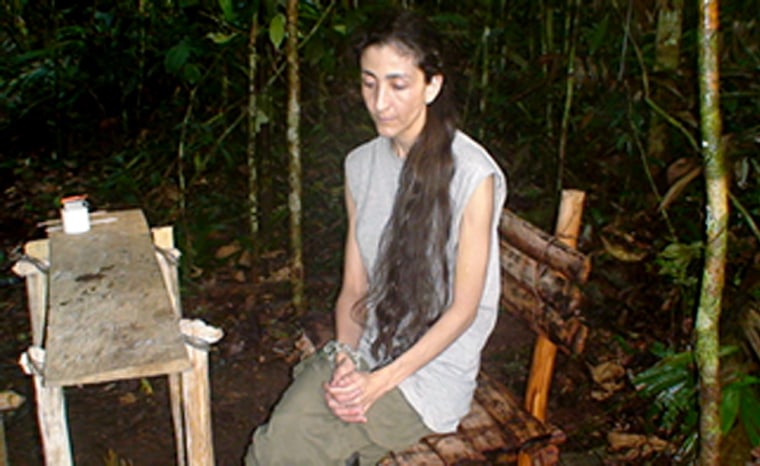Colombian officials on Friday revealed recently-seized videotapes of rebel-held hostages, among them three U.S. defense contractors and a former presidential candidate — the first images in years providing evidence the captives may be alive.
High Commissioner for Peace Luis Carlos Restrepo said the tapes were confiscated after the arrest Thursday evening of three suspected urban members of the Revolutionary Armed Forces of Colombia, better known as the FARC.
The government said it had also recovered a series of letters apparently written by the hostages, including what appeared to be the will of U.S. contractor Thomas Howes.
The findings come days after the FARC were severely criticized for failing to provide so-called “proof of life” during the recent mediation by Venezuelan president Hugo Chavez, who demanded such evidence from the guerrillas.
The videotapes, which were played at a news conference without sound, showed an extremely gaunt Ingrid Betancourt, the French-Colombian politician, apparently chained and in front of a jungle backdrop.
‘First proof of life for more than four years’
In the images, Betancourt, who was kidnapped as she campaigned for the Colombian presidency in 2002, has long hair and stares blankly at the ground. No images of her have been seen since 2003.
“The proof of life of Ingrid Betancourt obtained by the Colombian authorities is big news: it is the first proof of life for more than four years,” said David Martinon, a spokesman for French President Nicolas Sarkozy.
The government said that the tapes carried the date for Betancourt of Oct. 24, 2007. The tape of the Americans carried the date of the Jan. 1, 2007. But a kidnapped Colombia soldier, who appeared on the same tape, said the recording was being made on Oct. 23.
The Americans — Howes, Keith Stansell and Marc Gonsalves — were abducted by the FARC after their plane went down in Southern Colombia in 2003.
In the images, each American briefly stood alone on the screen, also against a jungle backdrop, looking haggard. The rebels had not released any images of them since 2003. The U.S. embassy in Bogota has called the three Americans the longest-held U.S. hostages currently in captivity.
Chavez's role as mediator ends
The FARC, which uses kidnapping as a tool to raise money and pressure the government, are offering to release these and other hostages in exchange for the freeing of hundreds of rebels from Colombian and U.S. prisons. Some hostages have endured a decade in FARC captivity.
Chavez, the Venezuelan leader, is well respected within the FARC and had been involved in trying to mediate a deal between the government and the rebels until last week when President Alvaro Uribe ended his role, saying Chavez had disobeyed a direct order in contacting the head of Colombia’s army.
In justifying its decision to end Chavez’s role as mediator, the Colombian government said the FARC had failed to respond to the Venezuelan president’s entreaties to give evidence the hostages were still alive.
Restrepo said the five tapes also showed images of another 12 Colombians, mainly members of the security forces.
Among the other evidence recovered by the army were a series of letters apparently written by the hostages, Restrepo said.
One undated letter was from Howes to his wife, and another, dated Nov. 26, 2006, was his will, said the government. Another note was from Gonsalves to the military commander of the FARC, known as “Mono Jojoy”, dated Oct. 23, 2007, and Betancourt wrote a letter to her mother, dated Oct. 24 2007. The government did not reveal details of the documents.
Diplomatic spat
Chavez’s dismissal from the process has led to a diplomatic spat between the two countries, with the Venezuelan leader announcing Wednesday he would have “no type of relationship” with the Colombian government as long as Uribe was president.
Families of the kidnapped have demanded that Uribe, whose father was killed by the FARC, invite Chavez back in to the process, saying that his involvement was the best hope in years of freeing their loved ones.
Uribe has advocated military rescues of the kidnapped, something opposed by all the families of the abducted, who fear the hostages will be killed in crossfire. Since taking office in 2002, Uribe’s administration has had no face to face meetings with the rebels.
